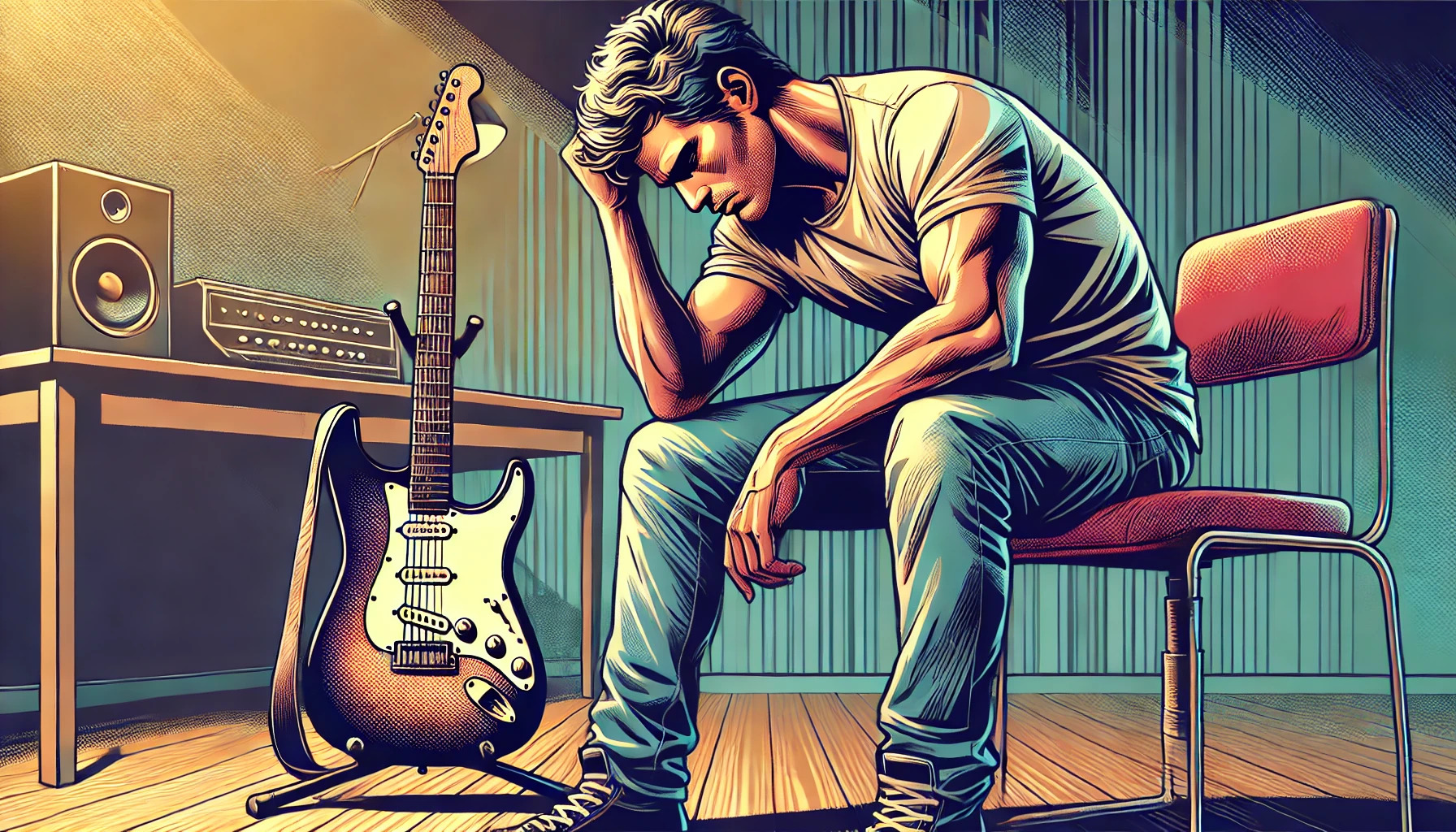UNDERSTANDING THE MOTIVATION DIP
UNDERSTANDING THE MOTIVATION DIP
Introduction:
Learning to play the guitar is a journey filled with excitement, challenges and growth. When you first start, the thrill of discovering new sounds and mastering chords keeps you highly motivated. However, as time goes on, it's natural for that initial burst of enthusiasm to wane.
“This is Normal”
Every guitarist, regardless of their level of experience, goes through periods of fluctuating motivation. These ebbs and flows are entirely natural and part of the learning process. It's essential to understand that feeling less enthusiastic or excited about practice from time to time doesn't mean you're failing or doing something wrong. Acknowledge these periods as a common experience among musicians, and remember that they are temporary.
This guide is designed to prepare you for these periods of lower motivation, offering insights into why they occur and practical strategies to keep your passion for guitar alive and thriving throughout your musical journey.
Progress Perception
When you first start learning guitar, the progress you make is often rapid and very noticeable. Each practice session can bring significant improvements, which is incredibly motivating. However, as you advance, the improvements become more incremental and less obvious. This slower progress can make it feel like you’re not improving at all, even though you are. To counter this, regularly reflect on how far you've come. Compare your current playing with recordings or memories of your earlier sessions to see the real progress you've made.
Expectation vs. Reality
Many students set high expectations for themselves, hoping to achieve certain milestones within a short period. When these expectations aren't met, it can lead to frustration and a sense of failure. It's crucial to set realistic and attainable goals to avoid this pitfall. Understand that mastery of any instrument is a gradual process that requires patience and perseverance. If you feel like you're not meeting your expectations, reassess them and make sure they are realistic and aligned with your current skill level and practice routine.
- Unrealistic Expectations: Setting goals that are too ambitious can lead to disappointment.
- Reassessment: Periodically review and adjust your goals to ensure they remain realistic and motivating.
- Patience: Accept that becoming proficient at the guitar takes time and consistent effort.
Incremental Progress
One of the challenges of long-term learning is that progress often comes in small, almost imperceptible increments. When you're practicing regularly, it can be hard to notice the subtle improvements you're making. This is why it's beneficial to keep a practice journal or record your playing periodically. By doing this, you can look back and clearly see how much you've improved over weeks or months, rather than expecting noticeable changes every day.
- Practice Journal: Keep track of your practice sessions and note any improvements or milestones. You can even mark practice off on a calendar.
- Recording Progress: Regularly record your playing to have concrete evidence of your progress over time.
- Small Wins: Celebrate minor improvements and milestones as they occur.
Comparing Yourself to Others
It's common to look at other guitarists, especially those who seem to progress faster or have more natural talent, and feel discouraged. However, it's important to remember that everyone’s learning journey is unique. Comparing yourself to others can be demotivating and unfair to your own efforts and progress. Focus on your own path and celebrate your personal achievements, no matter how small they may seem.
Individual Journey: Understand that everyone learns at their own pace and has unique strengths and challenges.
Avoid Comparisons: Focus on your progress rather than comparing yourself to others.
Celebrate Personal Achievements: Acknowledge and celebrate your own milestones and improvements.
Long-Term Perspective
Adopting a long-term perspective can help manage periods of low motivation. Learning to play the guitar is a lifelong journey with continuous opportunities for growth and improvement. Recognize that there will be ups and downs along the way, and that persistence is key to overcoming challenges. Embrace the process and appreciate the gradual nature of skill development.
- Lifelong Journey: Embrace the idea that learning guitar is a long-term commitment with continuous growth.
- Persistence: Keep practicing consistently, even during periods of low motivation.
- Gradual Development: Appreciate the slow and steady nature of progress and skill acquisition.
Tips to Stay Motivated
1.Set Realistic Goals: Break down your practice into manageable goals. Celebrate small achievements to maintain a sense of progress.
2. Mix Things Up: Change your practice routine. Learn a new song, try a different style or work on a new technique.
3. Focus on Enjoyment: Spend time playing the music you love. This can reignite your passion and remind you why you started playing.
4. Take Breaks: Sometimes, a short break can help. Step away for a day or two, then come back with a fresh perspective.
5. Attend Concerts: Watching live performances can be incredibly inspiring. It can remind you of your love for music and why you started playing.
6. Join a Community: Playing with others or joining an online guitar community can provide support, new ideas and a sense of camaraderie.
7. Reflect on Progress: Record yourself playing at different stages and listen to your improvements over time. This can be a powerful motivator.
When Motivation Dips
1. Acknowledge It: Recognize that a dip in motivation is part of the journey and not a sign of failure.
2. Stay Consistent: Even when motivation is low, maintain a regular practice schedule, even if it's just a few minutes a day.
3. Revisit Goals: Reflect on your original goals and adjust them if needed. Make sure they are still relevant and inspiring to you.
4. Seek Inspiration: Find new sources of inspiration, such as new artists, genres or guitar techniques.
By understanding these aspects of the motivation dip and employing strategies to stay motivated, you can better prepare yourself for the inevitable ups and downs of learning to play the guitar. This awareness can help you maintain a positive outlook and stay committed to your practice, even during challenging times.
Don Parkhurst Jr. - RockStar Guitar Academy
If you’re excited to start your guitar journey or reignite your passion for playing, our lesson program is here for you. Don’t miss the chance to grab a free Backstage Pass, where you can meet me, explore the program's unique offerings, and see how we can help you achieve your musical dreams—all free with no obligation. Just fill in the form on the right to get started!
Discover the RockStar Way!
Want to know more about our Rock Guitar Program? Book a studio meet-up or an online chat and I'll give you the full scoop.
Sign up for your Backstage Pass today and lets talk about how I can help you achieve your goals and dreams!
Need More Assistance?
Fill Out the Form Below to Connect with Us
We're here to help with any general questions or feedback. For detailed program inquiries, please sign up for our Backstage Pass
Top Guitar Blogs to Add to Your Reading List!
rockstar guitar Academy
© Copyright 2024 RockStar Guitar Academy. All Rights Reserved



